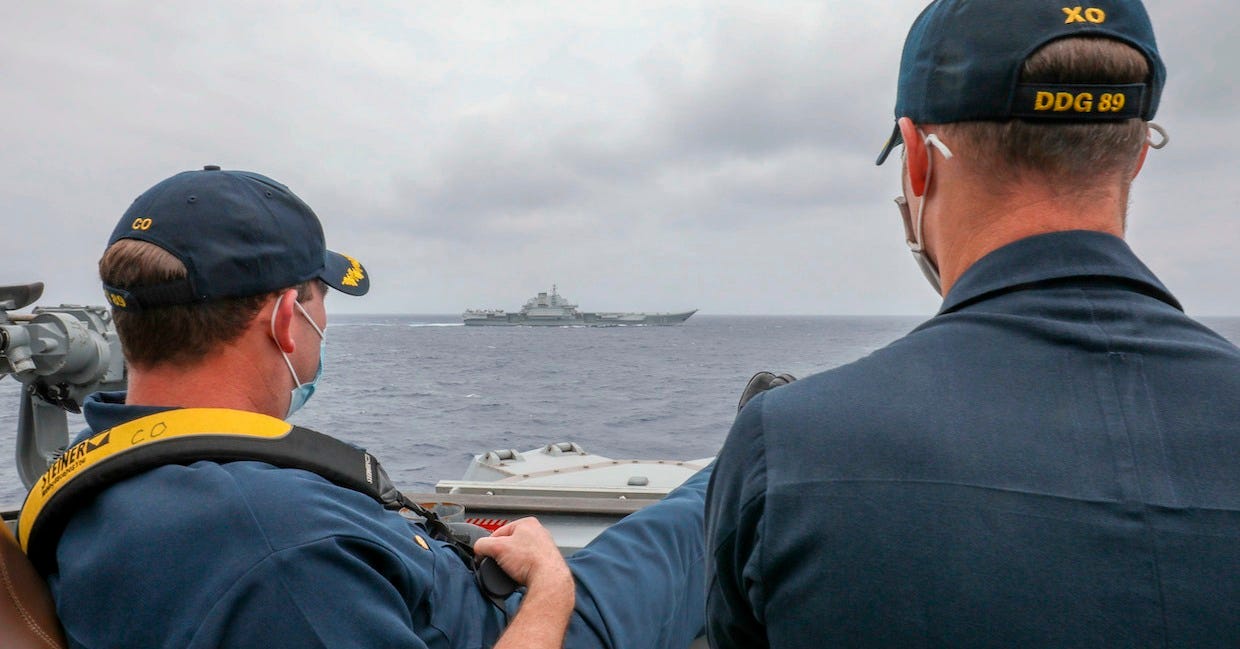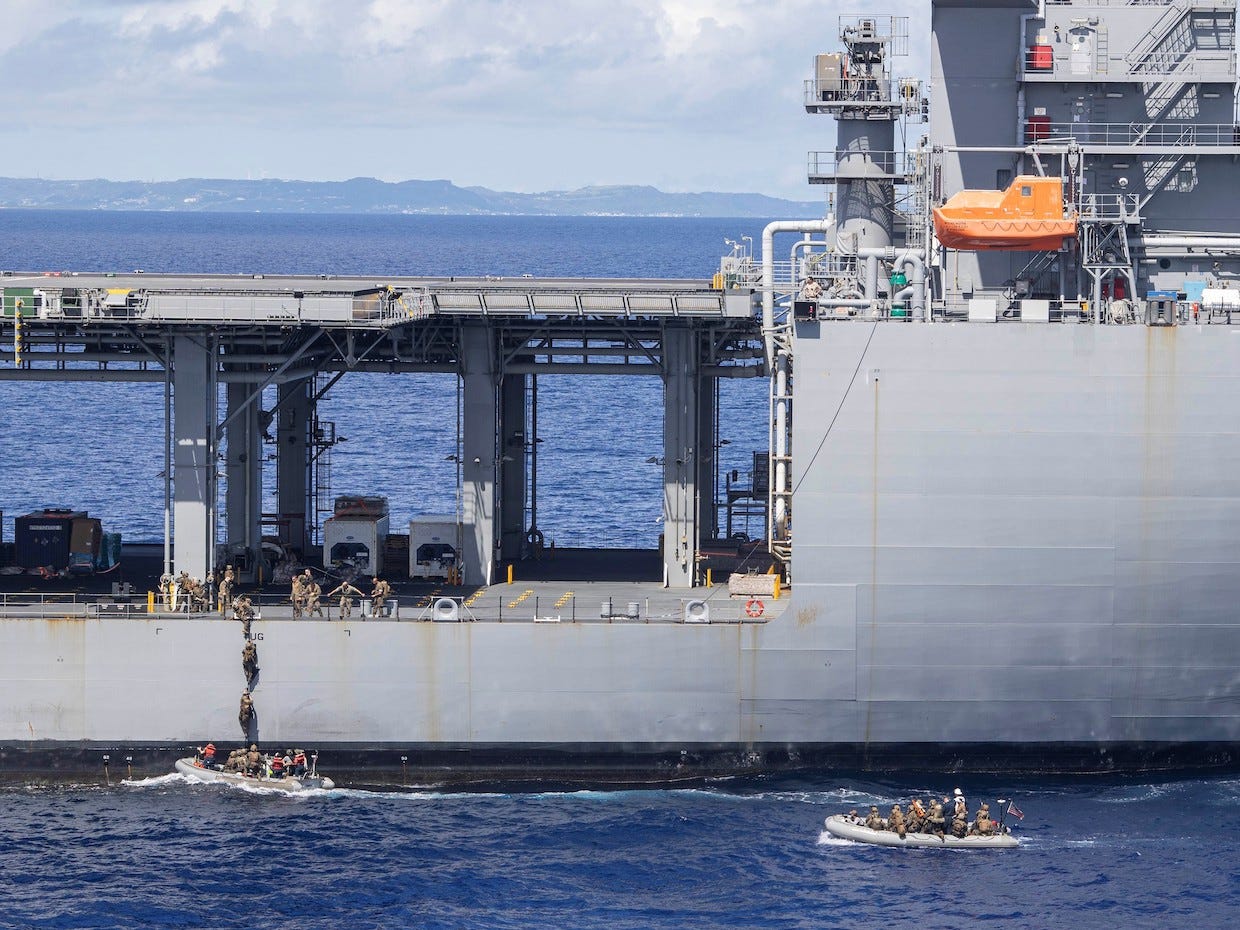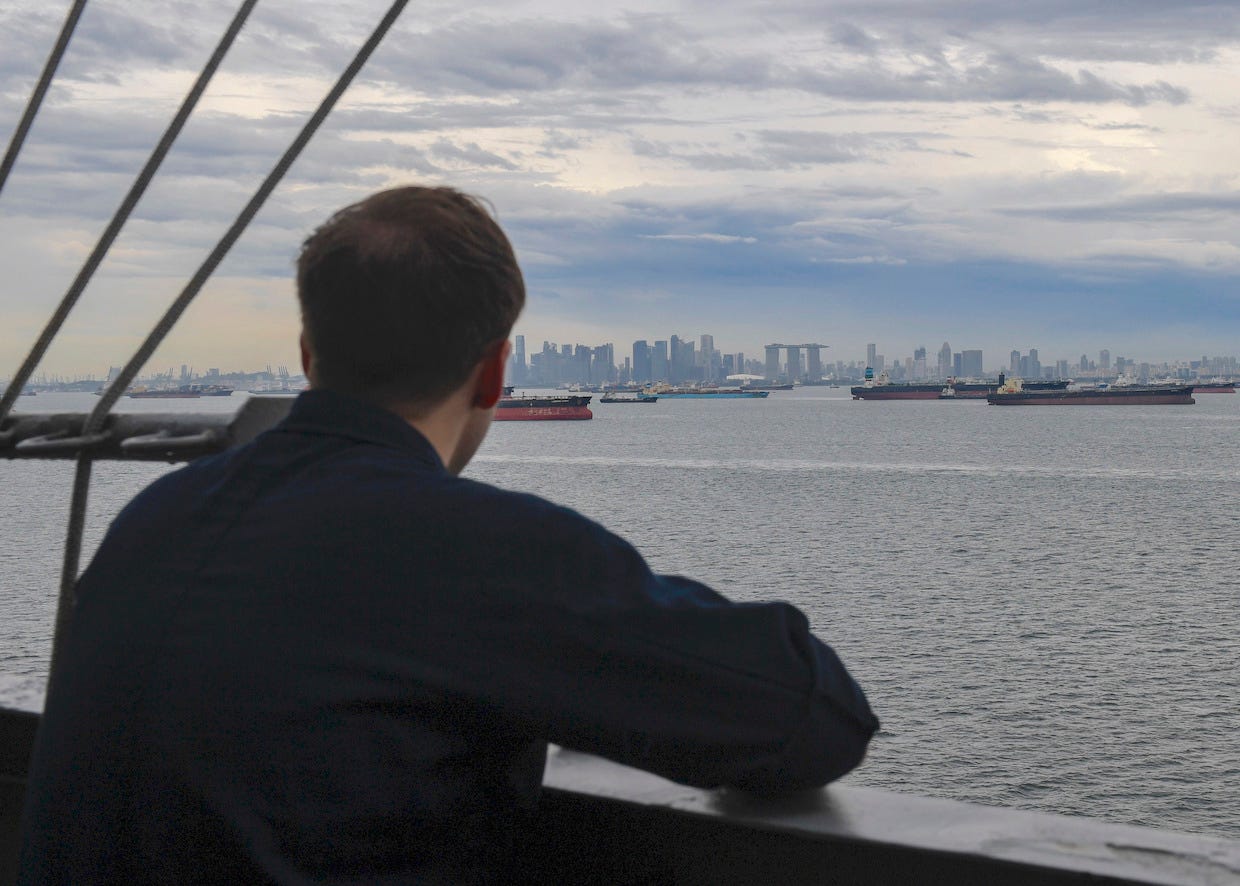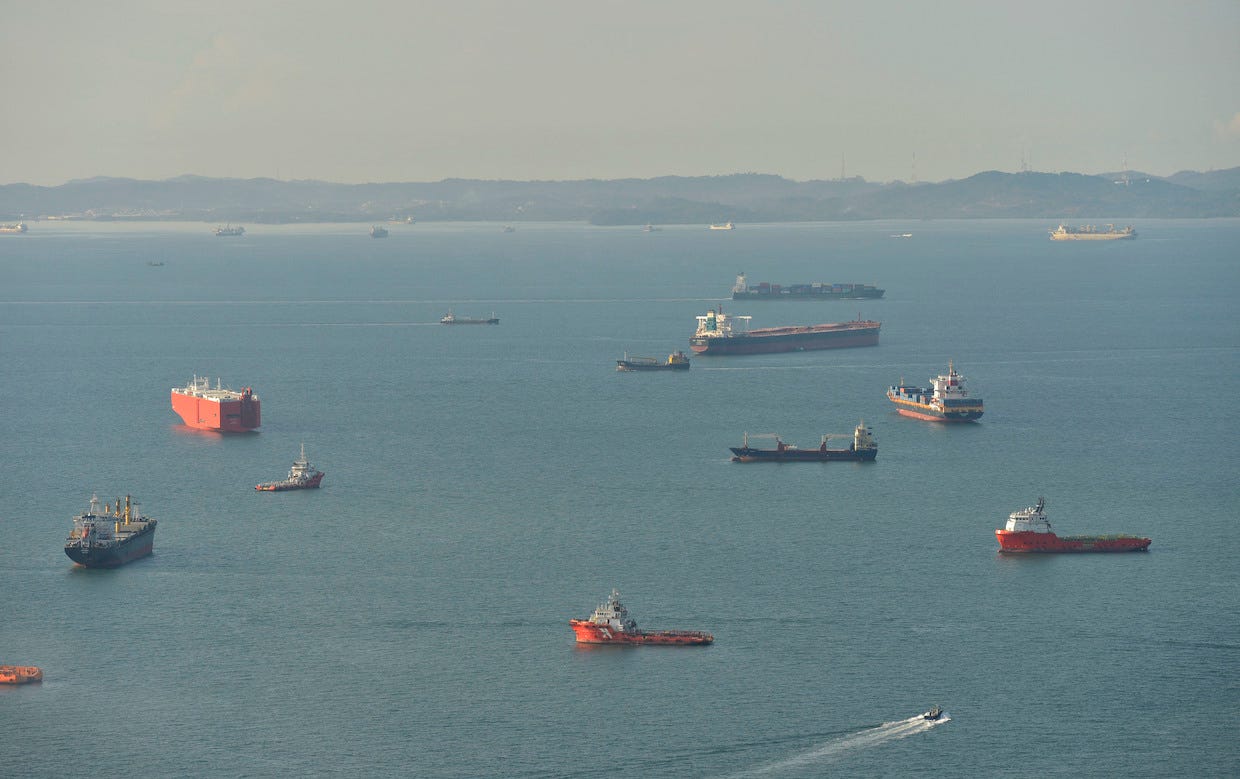How do you blockade China? Some US lawmakers really want to know
Some members of Congress want to know if the Pentagon would be able to starve "China's war machine."

BANGKOK — The House and Senate Armed Services Committees released their compromise version of the 2025 National Defense Authorization Act on December 7. The annual bill authorizes defense policies and programs, and with 1,800 pages and $895 billion in total spending, the bill covers a lot of ground.
But one thing that got left out is an amendment from Rep. Ronny Jackson requiring the Pentagon to study and report to Congress “on the feasibility of implementing one or more naval blockades of shipments of fossil fuels to China in the event of an armed conflict.”
Specifically, Jackson — a Texas Republican and retired US Navy officer who was retroactively demoted for misconduct while he was White House physician during the first Trump administration — wants to know what would be required to impose such a blockade, the suitability of several straits, including the Malacca Strait, as sites for blockades, and how China might use air or land routes or other sources, like domestic stockpiles, to meet its energy needs after a blockade was imposed.
The report, due 180 days after the bill is signed into law, “shall be submitted in unclassified form, but may include a classified annex,” the amendment says.
Jackson submitted the amendment to the 2024 NDAA, sparking a protracted debate along partisan lines during the committee’s markup hearing in June 2023.
Democrats argued it was unnecessary, saying the Pentagon already plans for many scenarios and lawmakers can already get briefs on those plans, and unnecessarily provocative, as it would amount to discussion about committing an act of war. “If China issued a plan tomorrow for how they would blockade the United States, we would consider that escalatory,” Rep. Adam Smith, the committee’s top Democrat, said during debate. “To be discussing an act of war within an elected body and approving it and putting it in the defense bill is a very provocative thing to do.”
Republicans defended the measure as not provocative and as an appropriate way to show resolve; some were also doubtful about the Pentagon’s planning, citing missteps during the Afghanistan withdrawal. Jackson said he was “in no way calling for war with China” but that “one of the best ways to diminish China's war machine would be to starve it of the energy it needs. Therefore, it stands to reason that the department should evaluate its capability to do exactly that.”
Rep. Mike Waltz, who will serve as Trump’s national security advisor, also supported the amendment, arguing that deterring China required giving it “certainty” about the “consequences” it could face. “For those reasons, I think making those consequences very public is exactly what we should do,” Waltz said.
Jackson’s amendment was adopted at that hearing in a vote of 31 to 28, but it was stripped from the final version of the 2024 NDAA by House and Senate negotiators, who instead directed the Pentagon to give lawmakers a briefing within 90 days of the bill’s passage on where China’s military gets its energy supplies and how a disruption would impact its readiness.

Jackson submitted the amendment again this year. Debate at the markup hearing in May was much shorter but covered the same points. Jackson, noting that the Pentagon had not provided the required briefing, said an assessment of how to impose a blockade was still needed and, based on the previous year’s vote, had broad support.
“To be clear, this amendment does not call for war. It is simply ensuring that we are prepared in the event of a conflict,” Jackson said. In response, Smith said, “I still think it is a bad idea to enshrine in law that we are contemplating a blockade of China,” adding: “I believe this is unnecessarily provocative, and I think it's just wrong to say that the Department of Defense is not contemplating all contingencies.”
The amendment was adopted by a voice vote this time but was again removed from the 2025 NDAA. Negotiators instead re-inserted the directive for a briefing on the Chinese military’s energy imports. This time, however, they said the Office of the Secretary of Defense could not spend more than 85% of its travel funds until Congress gets that briefing.
‘Blockades are very, very difficult’

While Jackson’s amendment didn’t make it into either NDAA, its submission and the arguments for it reflect the growing anxieties of US policymakers who have watched China accumulate diplomatic, economic, and military power and are now thinking more about how to undermine its ability to wage war.
Jackson said his amendment was based on a recommendation from the 2022 annual report of the US-China Economic and Security Review Commission, which Congress created in 2000 to examine US ties with China. (That recommendation hasn’t been included in subsequent annual reports.) While US defense officials are guarded about war plans, they do track where China gets its fuel. The Pentagon’s most recent report on China’s military, published in late 2023, said China “relies on maritime routes that transit the [South China Sea] and Strait of Malacca for most of its hydrocarbon deliveries,” including about 62% of its oil imports and 17% of its natural gas.
China’s leaders are well aware of the vulnerability that creates. In 2003, then-President Hu Jintao said “certain powers” — a reference to the US — had “encroached on” the Malacca Strait and tried to control navigation through it. Since then, Beijing has sought to resolve what has been called its "Malacca dilemma.” It has rapidly built up its navy to increase its presence along valuable sea routes. It has looked for alternative import routes, buying fuel from Russia via overland pipeline and investing in Indian Ocean ports and pipelines connecting them to mainland China to circumvent the strait. Beijing has also invested heavily in renewable energy to reduce its need for imports.
Despite that diversification, “Beijing will most likely continue to rely on oil and natural gas imports from Africa and the Middle East to meet energy demands for at least the next 10 years,” the Pentagon report said. But that doesn’t mean that cutting off China, which has the world’s largest navy (by number of warships) and is the world’s biggest ship owner (by gross tonnage), would be easy.
Current and former naval officers have suggested a variety of ways to try, from clamping down on China’s oceangoing trade to launching a combined close-in and distant blockade that intercepts enemy vessels and spares neutral ships. The size and worldwide reach of China’s merchant fleet would complicate those plans, and implementing them would require support from other countries, especially those around important waterways in Asia and the Middle East, who may not be interested in siding against China.
The nature of international maritime shipping, especially in the Malacca Strait — a long, narrow channel where hundreds of ships pass each day — adds other difficulties. “Look at the Malacca Strait and see how many ships are going through there and imagine trying to stop all of them and search them,” Tom Shugart, a former US Navy officer, said at a US-China commission hearing in March. “This is a harder problem than people think it is.”
Shugart, now a senior fellow at the Center for a New American Security, pointed to the Ever Given, a cargo ship that got stuck in the Suez Canal in 2021, to underscore the challenge: “That ship was Japanese-built, Japanese-owned, chartered by a Taiwanese company, with Indian officers on board, carrying trade from China to Europe. That’s part of the Chinese trade. Are you going to sink that ship?"
China’s military also gets a say. It has deployed thickets of anti-ship and anti-aircraft defenses on Chinese territory that would make it very difficult to mount a blockade in the East and South China Seas. It is also increasingly active overseas, using of a network of Chinese-owned and -operated ports. Many of those ports are on the Indian Ocean, where China has one military base, in Djibouti, and may gain access to others near important chokepoints. China is also developing a base in Cambodia that could support operations in the South China Sea and around the Malacca Strait.
While the Chinese military's ability to conduct overseas operations remains limited, protecting sea routes in those regions is likely a high priority. If the US implemented a distant blockade, then Chinese leaders “may consider ordering overseas [Chinese] forces to contest this blockade,” a recent Rand Corporation report said. “Thus, the United States should not assume that it can implement a distant blockade unopposed.”
China’s military has many shortcomings, like a lack of combat experience and questionable maintenance quality, that could affect its ability to defeat a blockade or impose one, as many observers think it’s training to do to Taiwan. But the US Navy’s extensive shipbuilding and maintenance problems and doubts about the US’s weapons stockpiles and defense industrial base only exacerbate Washington’s concerns about its ability to bottle up Chinese forces in a crisis or a war.
“A blockade sounds really simple,” Mike Studeman, who led the Office of Naval Intelligence before retiring as an admiral in 2023, said at an event in October when asked about a Chinese blockade of Taiwan. "But if you're a naval officer, if you live in this maritime world, you know that blockades are very, very difficult to actually implement over time, particularly with creative opponents and with adversaries who have navies that will be rapidly approaching or are already there."







Enlightening and informative, as usual.